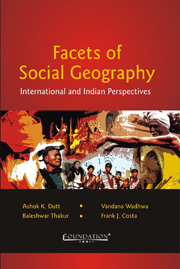Book contents
- Frontmatter
- Contents
- Foreword
- Preface
- Acknowledgements
- List of Contributors
- I Introductory Framework: Allen G. Noble's Contribution to Social Geography
- II Conceptual and Theoretical Basis of Social Geography
- III Social Geography from a Global Perspective
- 9 Regional Patterns of Spanish-Language Newspaper Publication in the United States, 1848–1992
- 10 Enterprise Zones in a Global Perspective: Socioeconomic Consequences
- 11 Multi-faceted Regional Inequality in China
- 12 Social Geography of the Minorities in Israel
- 13 Urban Sprawl and Socioeconomic Change in the Kathmandu Valley, Nepal
- 14 Ave Maria: A Planned Town in Collier County, Florida
- IV Social Geography in the Indian Context
- V Indian Social Geography: City and State Context
- Index
11 - Multi-faceted Regional Inequality in China
from III - Social Geography from a Global Perspective
Published online by Cambridge University Press: 05 June 2012
- Frontmatter
- Contents
- Foreword
- Preface
- Acknowledgements
- List of Contributors
- I Introductory Framework: Allen G. Noble's Contribution to Social Geography
- II Conceptual and Theoretical Basis of Social Geography
- III Social Geography from a Global Perspective
- 9 Regional Patterns of Spanish-Language Newspaper Publication in the United States, 1848–1992
- 10 Enterprise Zones in a Global Perspective: Socioeconomic Consequences
- 11 Multi-faceted Regional Inequality in China
- 12 Social Geography of the Minorities in Israel
- 13 Urban Sprawl and Socioeconomic Change in the Kathmandu Valley, Nepal
- 14 Ave Maria: A Planned Town in Collier County, Florida
- IV Social Geography in the Indian Context
- V Indian Social Geography: City and State Context
- Index
Summary
Regional inequality is an important area of academic inquiry and government policy. Scholars, however, disagree over the trend of regional inequality and the forces underlying it. Neoclassical doctrines suggest that regional differentials will eventually be equalized under efficient markets and factor mobility conditions, while divergence perspectives, especially dependency and structural schools, contend that spatial disparities are inevitable and self-reinforcing (Borts and Stein, 1964; Soja, 1980). Empirical evidence in developed and developing countries is mixed. This is especially so in transitional economies where the pace, scope and consequences of reforms are uneven.
Foreign Direct Investment (FDI) has had a far-reaching impact on host economies, such as capital formation, employment, technology, trade, economic growth and core-periphery relations (Taylor and Thrift, 1982; Dicken, 1998). On the one hand, FDI is regarded as a dynamic force in economic development providing capital, creating jobs, spreading new technology, promoting trade and improving economic well-being. On the other hand, FDI is considered to be responsible for economic dependence, cultural imperialism and the intensification of core-periphery relationships in developing countries. The recent rapid globalization of economic activities and changing roles of government institutions further compound the patterns and processes of regional inequality. Globalization is increasingly recognized in the development literature as a factor that further marginalizes the periphery and generates new forms of poverty and inequality (Hirst and Thompson, 1996; Sassen, 1991). However, there is a lack of theoretically-informed empirical work on the impact of FDI on regional inequality in developing transitional economies.
- Type
- Chapter
- Information
- Facets of Social GeographyInternational and Indian Perspectives, pp. 209 - 227Publisher: Foundation BooksPrint publication year: 2012



